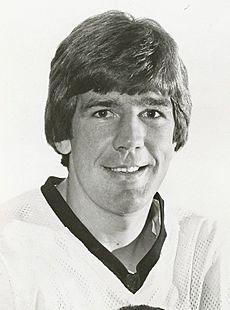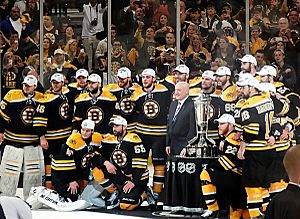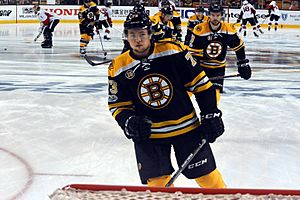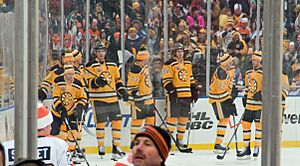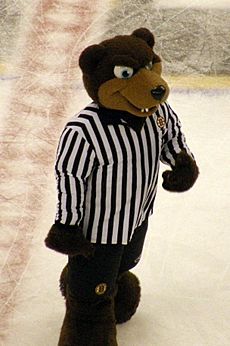Boston Bruins facts for kids
Quick facts for kids Boston Bruins |
|
|---|---|
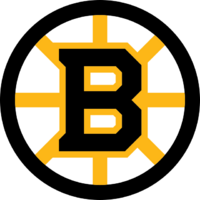 |
|
| Conference | Eastern |
| Division | Atlantic |
| Founded | 1924 |
| History | Boston Bruins 1924–present |
| Home arena | TD Garden |
| City | Boston, Massachusetts |
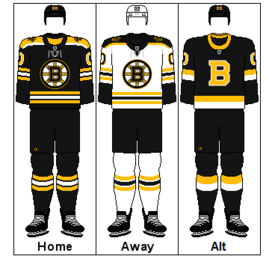 |
|
| Colors | Black, gold, white |
| Media | NESN The Sports Hub (98.5 FM) NBC Sports Boston |
| Owner(s) | Delaware North (Jeremy Jacobs, chairman; Charlie Jacobs, CEO) |
| General manager | Don Sweeney |
| Head coach | Marco Sturm |
| Captain | Vacant |
| Minor league affiliates | Providence Bruins (AHL) Maine Mariners (ECHL) |
| Stanley Cups | 6 (1928–29, 1938–39, 1940–41, 1969–70, 1971–72, 2010–11) |
| Conference championships | 5 (1987–88, 1989–90, 2010–11, 2012–13, 2018–19) |
| Presidents' Trophies | 4 (1989–90, 2013–14, 2019–20, 2022–23) |
| Division championships | 27 (1927–28, 1928–29, 1929–30, 1930–31, 1932–33, 1934–35, 1937–38, 1970–71, 1971–72, 1973–74, 1975–76, 1976–77, 1977–78, 1978–79, 1982–83, 1983–84, 1989–90, 1990–91, 1992–93, 2001–02, 2003–04, 2008–09, 2010–11, 2011–12, 2013–14, 2019–20, 2022–23) |
The Boston Bruins are a professional ice hockey team from Boston, Massachusetts. They play in the National Hockey League (NHL) as part of the Atlantic Division in the Eastern Conference. The team started in 1924, making them the third-oldest active team in the NHL. They are also the oldest NHL team in the United States.
The Bruins are one of the "Original Six" NHL teams. The other five are the Detroit Red Wings, Chicago Blackhawks, Montreal Canadiens, New York Rangers, and Toronto Maple Leafs. The Bruins have won six Stanley Cup championships. This ties them for fourth-most wins with the Blackhawks. Only the Canadiens (24), Maple Leafs (13), and Red Wings (11) have won more. The Bruins have also won the Presidents' Trophy four times. Their most recent win was in 2022–23, when they earned 135 points. This was the most points ever in one NHL season.
The Bruins first played at the Boston Arena, now called Matthews Arena. It is the world's oldest indoor ice hockey building still used for the sport. After that, the team played at the Boston Garden for 67 seasons, from 1928 to 1995. Then, they moved to their current home, TD Garden.
Contents
Team History
Starting Out (1924–1942)
In 1924, the NHL decided to expand into the United States. A sports promoter named Thomas Duggan sold one of the new team options to Boston grocery owner Charles Adams. This made the Bruins one of the NHL's first expansion teams and the first U.S.-based NHL team. Adams hired Art Ross, a former star player, as the team's general manager.
Ross chose "Bruins" as the team's nickname. This name comes from classic folk tales about brown bears. The team's first uniform colors were brown and yellow. These colors came from Adams' grocery store chain, First National Stores.
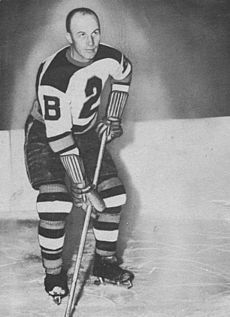
On December 1, 1924, the Bruins won the first NHL game ever played in the United States. They hosted the Montreal Maroons at Boston Arena. Smokey Harris scored the first Bruins goal, leading to a 2–1 win. This was one of the few good moments that season. The Bruins lost their next 11 games and finished last with a 6–24–0 record. The team played three more seasons at the Arena. After that, they became the main team at Boston Garden.
In their second season, 1925–26, the Bruins improved a lot. They had a winning record of 17–15–4. This was a huge improvement, but they just missed the playoffs.
For their third season, 1926–27, Art Ross signed several star players from another league that had closed. One of these was defenseman Eddie Shore. He became one of the greatest players in NHL history with the Bruins. Boston easily made the playoffs. In their first playoff run, the Bruins reached the Stanley Cup Final. They lost to the Ottawa Senators.
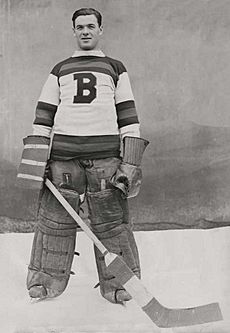
The 1928–29 season was the first played at Boston Garden. In 1929, the Bruins beat the New York Rangers to win their first Stanley Cup in two games. Key players on this championship team included Shore, Harry Oliver, Dit Clapper, Dutch Gainor, and goaltender Tiny Thompson.
The next season, 1929–30, the Bruins had an amazing regular season. They won 38 games, lost 5, and tied 1. This .875 winning percentage is still an NHL record! They scored many goals but lost to the Montreal Canadiens in the Stanley Cup Final.
The Bruins teams of the 1930s featured stars like Shore, Thompson, Clapper, Babe Siebert, and Cooney Weiland. They led the league five times during this decade. In 1939, the team won its second Stanley Cup. That year, Thompson was traded for a new goalie, Frank Brimsek. Brimsek had an incredible rookie season. He won two major awards and was nicknamed "Mr. Zero." The team also had Bill Cowley, Shore, Clapper, and the famous "Kraut line" of center Milt Schmidt, right winger Bobby Bauer, and left winger Woody Dumart.
In the 1939–40 season, Shore was traded. In 1941, the Bruins won their third Stanley Cup. They lost only eight games and finished first in the regular season. This was their last Stanley Cup win for 29 years. World War II greatly affected the Bruins. Brimsek and the "Krauts" joined the Royal Canadian Air Force. They missed many of their best playing years because of the war.
The "Original Six" Era (1942–1967)
By 1942, the NHL had only six teams left. These teams became known as the "Original Six" for the next 25 years.
In 1944, Bruins player Herb Cain set an NHL record with 82 points in a season. However, the Bruins did not make the playoffs that year.
The stars returned from World War II for the 1945–46 season. Clapper led the team back to the Stanley Cup Final as a player and coach. He retired as a player after the next season, becoming the first player to play 20 NHL seasons. After 1946, the Bruins lost in the first playoff round for three years in a row.
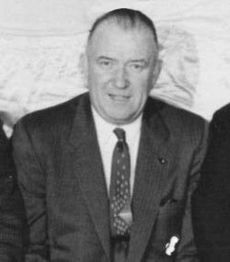
In 1951, Walter A. Brown, who owned the Boston Celtics, bought the Bruins. The Bruins had some good moments in the 1950s. They reached the Stanley Cup Finals in 1953, 1957, and 1958. But they lost to the Montreal Canadiens each time. Between 1947 and 1967, the Bruins only had four winning seasons. They missed the playoffs for eight years in a row, from 1960 to 1967.
On January 18, 1958, Willie O'Ree became the first black NHL player. He played for the Bruins in the 1957–58 and 1960–61 seasons. The "Uke Line" of Johnny Bucyk, Vic Stasiuk, and Bronco Horvath joined the team in 1957. They helped the Bruins have a successful period in the late 1950s. After that, the team went through a tough rebuilding time in the early to mid-1960s.
Expansion and the "Big Bad Bruins" (1967–1979)
In 1964, Weston Adams bought the Bruins again. Adams signed future superstar defenseman Bobby Orr. Orr joined the league in 1966. He won the Calder Memorial Trophy as Rookie of the Year. Even with Orr, the Bruins missed the playoffs that season.
The next season, Boston started a record-breaking streak of 29 straight playoff appearances. The Bruins then made a huge trade, getting forwards Phil Esposito, Ken Hodge, and Fred Stanfield from Chicago. Esposito became the league's top goal scorer. He was the first NHL player to get over 100 points in a season. With other stars like Bucyk, John McKenzie, Derek Sanderson, and goalie Gerry Cheevers, the "Big Bad Bruins" became one of the best teams in the league.
In 1970, the Bruins ended a 29-year Stanley Cup drought. They beat the St. Louis Blues in four games in the 1970 Stanley Cup Final. Orr scored the winning goal in overtime to clinch the Cup. That season, Orr won four major awards, which no other player has ever done in one season.
The Bruins were incredibly strong in the 1970–71 season. They had seven of the league's top ten scorers. They also set a record for wins in a season. Even though they were favored to win the Cup again, they lost to the Canadiens in seven games.
The next season, Esposito and Orr were still the top two scorers. Boston won the Stanley Cup again by beating the New York Rangers in six games in the 1972 Stanley Cup Final.
The 1972–73 season brought many changes. Several Bruins players left to join a new league, the World Hockey Association (WHA). The Adams family, who had owned the team since the 1920s, sold it. The Bruins lost in the first round of the 1973 playoffs. In 1974, the Bruins finished first in the regular season again. They had three players with over 100 points. However, they lost the 1974 Stanley Cup Final to the Philadelphia Flyers.
Don Cherry became the new coach in 1974–75. The Bruins became known as the "Lunch Pail A.C." They were a tough, hardworking team with players like Gregg Sheppard, Terry O'Reilly, and Peter McNab. This was also Bobby Orr's last full season before his knee injuries became too severe. The Bruins lost in the first round of the 1975 playoffs.
The Bruins traded Esposito for Brad Park, Jean Ratelle, and Joe Zanussi. They reached the semifinals again but lost to the Flyers. After that, Orr left the team as a free agent.
Goalie Cheevers returned in 1977. The Bruins beat the Flyers in the semifinals but were swept by the Canadiens in the Stanley Cup Final. The same thing happened in 1978. The Bruins had 11 players score 20 or more goals, an NHL record. But they lost to Montreal in the Cup Final in six games. After that series, John Bucyk retired.
The 1979 semifinals against the Canadiens ended Don Cherry's time as coach. In the final game, the Bruins were ahead but got a penalty for having too many men on the ice. Montreal tied the game on the power play and won in overtime. Cherry was fired after this.
The Ray Bourque Era (1979–2000)
The 1979–80 season brought a new coach and a trade that brought Ray Bourque to the team. Bourque became one of the greatest defensemen ever and the face of the Bruins for over 20 years. The Bruins made the playoffs every year in the 1980s with stars like Park, Bourque, and Rick Middleton. In 1982–83, they had the best record in the league but did not reach the Stanley Cup Finals.
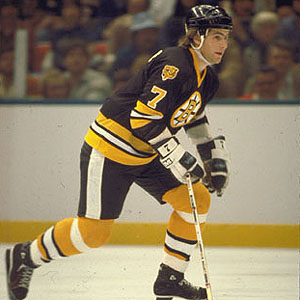
Bourque, Cam Neely, and Keith Crowder led the Bruins to another Stanley Cup Finals appearance in 1988. They played against the Edmonton Oilers but lost in four games. Boston returned to the Stanley Cup Finals in 1990. They had Neely, Bourque, Craig Janney, and goalies Andy Moog and Reggie Lemelin. They lost to the Oilers again, this time in five games.
In 1991 and 1992, the Bruins lost in the conference finals to the Pittsburgh Penguins. From the 1992–93 NHL season until 2011, the Bruins did not get past the second round of the playoffs.
The 1992–93 season was disappointing. Even though they had the second-best record, Boston was swept in the first round by the Buffalo Sabres. Bourque was named to the NHL All-Star First Team.
The 1995 season was the Bruins' last at the Boston Garden. They moved into the FleetCenter, now called the TD Garden. In the 1996 playoffs, the Bruins lost their first-round series.
In 1997, Boston missed the playoffs for the first time in 30 years. This ended a major professional sports record for most consecutive playoff seasons. The Bruins lost in the first round of the 1998 playoffs. In 1999, they won their first-round series but lost in the second round.
The New Millennium (2000–2015)
In the 1999–2000 season, the Bruins finished last in their division and missed the playoffs.
After a slow start, the Bruins hired Mike Keenan as coach. Even with some improvement, they missed the playoffs in 2000–01. The next season, 2001–02, the Bruins won their division title. Key players included Joe Thornton, Sergei Samsonov, and Bill Guerin. They lost in six games to the Montreal Canadiens in the first round of the playoffs.
The 2002–03 season saw the Bruins finish seventh in the East. They lost to the New Jersey Devils in five games. In 2003–04, the Bruins won another division title. They had a 3–1 series lead against the Canadiens but lost the next three games and were upset.
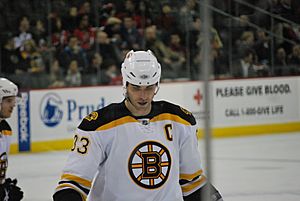
The 2004–05 NHL season was canceled due to a lockout. When play resumed, the Bruins signed star defenseman Zdeno Chara and center Marc Savard. The 2006–07 season ended with the team finishing last in their division.
After that disappointing season, Claude Julien was hired as coach. The 2007–08 season saw the Bruins make the playoffs. Young players like Milan Lucic, David Krejci, and Vladimir Sobotka showed great potential.
The 2008–09 season saw the Bruins have the best record in the Eastern Conference. They beat the Canadiens in four games but lost to the Carolina Hurricanes in seven games.
On January 1, 2010, the Bruins won the 2010 NHL Winter Classic against the Philadelphia Flyers at Fenway Park. They were the first home team to win an outdoor classic game. They finished sixth in the Eastern Conference and won their first-round playoff series against the Buffalo Sabres. However, Boston became only the third team in NHL history to lose a playoff series after leading 3–0, when they lost to the Philadelphia Flyers in game 7.
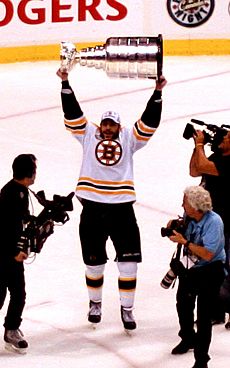
In the 2011 Stanley Cup playoffs, the Bruins beat the Montreal Canadiens in seven games. Then, they swept the Philadelphia Flyers in four games. On May 6, they advanced to the conference finals for the first time since 1992. Boston then defeated the Tampa Bay Lightning in seven games. They reached the Stanley Cup Final for the first time since 1990. They faced the Vancouver Canucks and defeated them in seven games, winning their first Stanley Cup since 1972. The 2010–11 Bruins were the first team in NHL history to win three Game 7s in the same playoff run.
After their Stanley Cup win, the Bruins finished second in the Eastern Conference in the 2011–12 season. They won their division but lost to the Washington Capitals in the first round of the 2012 Stanley Cup playoffs in seven games.
Before the lockout, goalie Tim Thomas decided to sit out the 2012–13 season. The Bruins battled the Montreal Canadiens for their division title all season.
In the 2013 playoffs, the Bruins beat the Toronto Maple Leafs in seven games. They then beat the New York Rangers in five games and swept the Pittsburgh Penguins in four games. This sent them to the Stanley Cup Finals against the Chicago Blackhawks. They lost to Chicago in six games, with three games going into overtime.
In the 2013–14 season, the Bruins won the Presidents' Trophy. They finished first in their division with 117 points. However, their regular season success did not lead to another conference finals appearance. They won their first-round series but lost to the Canadiens in seven games in the 2014 playoffs.
In the 2014–15 season, the Bruins missed the playoffs by just two points. They earned 96 points, which was a record for the most points by a team that did not make the playoffs.
Don Sweeney Era (2015–Present)
On April 15, 2015, Peter Chiarelli was fired as general manager. On May 20, former player Don Sweeney was named the team's new general manager. On January 8, 2016, the Bruins reached 3,000 wins in team history. Only their rival, the Canadiens, had done this before. The team was expected to make the playoffs in the 2015–16 season. However, they had a poor record at home and lost many road games late in the season. They missed the playoffs for the second year in a row.
During the 2016–17 season, the Bruins fired coach Claude Julien. Bruce Cassidy became the interim coach. Cassidy's changes helped the Bruins finish third in their division. They made the playoffs for the first time since 2014. In the first round, they lost to the Ottawa Senators in six games.
Cassidy returned as head coach for the 2017–18 season. He led the Bruins to the playoffs again. They had a great record of 50–20–12, including an 18-game point streak. They finished one point behind the Tampa Bay Lightning for the top spot in their division. They beat the Toronto Maple Leafs in the first round but lost to the Lightning in the second round. Young players like Jake DeBrusk and Charlie McAvoy played very well.
During the 2018–19 season, the Bruins finished second in their division. They acquired Charlie Coyle and Marcus Johansson during the season. In the 2019 Stanley Cup playoffs, they faced the Maple Leafs again and won in seven games. They then beat the Columbus Blue Jackets in six games to reach the conference finals. The Bruins swept the Carolina Hurricanes in four games, winning the Prince of Wales Trophy. They advanced to the 2019 Stanley Cup Final for the third time in 10 years. They played the St. Louis Blues in a rematch of the 1970 Final. This time, the Blues won in seven games.
During the 2019–20 season, the Bruins had the best record in the league. The NHL season was paused on March 12, 2020, due to the COVID-19 pandemic. When the league resumed, the Bruins were awarded the Presidents' Trophy. David Pastrnak won the Maurice "Rocket" Richard Trophy for scoring the most goals. In the 2020 Stanley Cup playoffs, the Bruins won their first round but lost to the Tampa Bay Lightning in the second round. In the 2020–21 season, the Bruins made the playoffs again. They won their first round but lost to the New York Islanders in six games. In the next season, the Bruins made the playoffs as a wild card team but lost to the Hurricanes in seven games. After the season, coach Cassidy was fired. Jim Montgomery was hired as the new head coach on July 3, 2022.
During the 2022–23 season, the Bruins broke several NHL records. They set a record for the longest home winning streak from the start of a season (14 games). On March 2, 2023, they became the fastest team to reach 100 points in NHL history. Nine days later, they became the fastest team to get 50 wins. On April 9, 2023, the Bruins set a new record for most games won in a season (63). Two days later, they set a new record for most points in a single season (133), finishing with 65 wins and 135 points. However, the Bruins lost to the Florida Panthers in seven games in the first round of the 2023 Stanley Cup playoffs, after leading the series 3–1.
In the 2023–24 season, the Bruins finished second in their division. In the first round of the 2024 playoffs, they beat the Toronto Maple Leafs in seven games. In the second round, they were eliminated by the Florida Panthers again, this time in six games.
In the 2024–25 season, the Bruins fired Jim Montgomery and named Joe Sacco as interim head coach. They finished last in their division and missed the playoffs for the first time since 2016.
Ahead of the 2025–26 NHL season, the Bruins hired Marco Sturm as their 30th head coach. Sturm played for the Bruins from 2005 to 2010.
Team Information
Logo and Uniforms
Since 1948, the Bruins' main logo has been an eight-spoked, black and gold wheel with the letter "B" in the center. This design is a nod to Boston's nickname, "The Hub." The logo has been updated many times, with its current look finalized in 2025. The general design, used since 1949, features the circle and "B" in black with gold spokes.
The Bruins also have an alternate logo. It shows a walking bear with the team name around it. This logo was first used from 1924 to 1932. A modern version became the team's secondary logo in 2007. In 2025, this was updated to feature only the bear itself.
The Bruins' original colors were brown and gold. They wore brown uniforms in their first season. The next season, they switched to white uniforms with brown and gold stripes. Their pants were beige, and socks were gold or white. After the 1932 season, the walking bear logo was replaced with a simple block "B."
Starting in the 1935–36 season, the Bruins changed brown to black. They also wore gold socks all the time. The "B" logo moved to the sleeves, and the uniform number was on the front. Black pants replaced the beige ones.
For most of the 1940s, the Bruins had gold numbers on their white uniforms. To celebrate their 25th anniversary, the Bruins released a new white uniform with the first "Spoked B" logo.
In 1955, the Bruins started using the "Spoked B" logo on their black uniforms. They also released a gold jersey. For a few games between 1958 and 1965, the Bruins even wore gold pants!
In 1967, the Bruins stopped using the gold uniforms. They brought back the black uniforms with gold numbers. These uniforms, like the white ones, had some small changes until 1995.
Starting with the 1995–96 season, the Bruins released new uniforms. They had a thick stripe across the sleeves. They also had a gold third jersey with the famous "Pooh Bear" logo. These gold jerseys were used until 2006. After that, the Bruins wore black throwback uniforms based on their 1970s design.
In 2007, the Bruins updated their uniforms again. They had a new "Spoked B" logo with serifs (small lines at the ends of letters). The design borrowed from the 1970s uniforms. They also added a new version of the original walking bear logo on the shoulders. The next season, they released new black third jerseys with the bear logo on the front.
For the 2010 Winter Classic, the Bruins wore a brown and gold version of their 1948–49 design. For the 2016 Winter Classic, they wore a black and gold version of their original brown uniforms.
The Bruins kept a similar design when they moved to Adidas uniforms in 2017. However, the black uniforms now had black socks.
For the 2019 Winter Classic, the Bruins wore white uniforms with brown and gold stripes. This honored their mid-1930s uniforms. A simple "B" logo was on their new black alternate uniform, which came out in the 2019–20 season. It honored the team's 1950s uniforms.
Before the 2020–21 season, Adidas released "Reverse Retro" alternate uniforms. The Bruins' version was a gold and black design from 1977 to 1995. A second "Reverse Retro" uniform came out in the 2022–23 season. It was a white version of the 1995–2006 "Pooh Bear" alternates.
Boston's 2023 Winter Classic uniform mixed different styles from the team's history. The black uniform had gold stripes and vintage white letters.
For the 2023–24 centennial season, the Bruins revealed new uniforms and a special logo. The new "Spoked B" logo looked more like the original design from 1949 to 1995. The white uniform had this logo, and the black uniform had an inverted version. The gold color used was a paler "Centennial gold." The three gold stripes on each sleeve represented the six Stanley Cups the team has won. An alternate beige uniform was also released. This design was a modern take on the first "Spoked B" logo from 1948–49.
On December 1, 2024, the Bruins wore a special uniform to celebrate their 100th anniversary. The design was based on their 1981–1995 uniforms. The collar even featured the score of the team's first-ever game!
In June 2025, the team announced a logo change for the 2025–26 season. The centennial "Spoked B" logo became the main logo. The new uniforms are inspired by the 1977–1995 uniforms. They also have an updated "walking bear" patch on the left shoulder.
Ownership and Management
The team's founder, Charles Adams, owned the team until 1936. Then, his son Weston Adams and others took over. Weston Adams was the main owner until 1951. After that, the Boston Garden-Arena Corporation bought the team. Walter A. Brown, who founded the Boston Celtics, ran the team from 1951 until he passed away in 1964. Weston Adams then returned as team president. In 1969, his son, Weston Adams, Jr., took over.
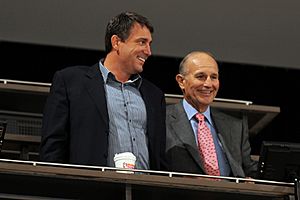
On December 7, 1973, Storer Broadcasting bought the Bruins. In August 1975, Storer Broadcasting sold the team to a group led by Jeremy Jacobs. Jacobs promised to keep Bobby Orr as a condition of the purchase.
Jeremy Jacobs represents the Bruins on the NHL's board of governors. He was elected chairman of the board in 2007. Jacobs is often named one of the most important people in sports. His company owns TD Garden. He is also partners with John W. Henry, who owns the Boston Red Sox, in the New England Sports Network (NESN).
Since Jacobs became owner in 1975, the Bruins have been very competitive. They made the playoffs for 29 seasons in a row. However, they have only won the Stanley Cup once under his ownership, in 2011. Before Jacobs, the Bruins had won the Stanley Cup five times. Under Jacobs, the Bruins have reached the Stanley Cup Finals seven times.
Since 2005, Jacobs' public image has improved. He has invested in the team and rebuilt the front office to make the team more competitive. Don Sweeney is the current general manager. Cam Neely has been the team president since the 2011 Stanley Cup win.
In 2025, the Bruins extended Don Sweeney's contract as General Manager. They also added former captain Zdeno Chara as a front office consultant.
The main people in the Bruins front office are:
- Jeremy Jacobs – owner
- Charlie Jacobs – principal
- Don Sweeney – general manager
- Cam Neely – president
- Harry Sinden – senior advisor to the owner
Training Facilities
The Bruins now train at the Warrior Ice Arena in Boston. They moved there in September 2016.
Bruins' Mascots
Blades the Bruin is the Bruins' official team mascot. He is an anthropomorphic (human-like) bear. Blades travels around Boston to raise money for the Bruins Foundation.
Team Songs
When Bruins games started being shown on TV in 1967, the song "Nutty" by The Ventures was chosen as the opening music. This song has been linked to the Bruins ever since.
At the arena, an organ version of the 1920s song "Paree" has been played for decades. It was played when players entered the ice and, for many years, after each Bruins' goal. In 1998, "Paree" was replaced as the goal song by "Kernkraft 400 (Sport Chant Stadium Remix)" by Zombie Nation.
Season Records
This is a short list of the Bruins' last five seasons. For a full list, see List of Boston Bruins seasons.
Note: GP = Games played, W = Wins, L = Losses, OTL = Overtime losses, Pts = Points, GF = Goals for, GA = Goals against
| Season | GP | W | L | OTL | Pts | GF | GA | Finish | Playoffs |
| 2020–21 | 56 | 33 | 16 | 7 | 73 | 168 | 136 | 3rd, East | Lost in second round, 2–4 (Islanders) |
| 2021–22 | 82 | 51 | 26 | 5 | 107 | 255 | 220 | 4th, Atlantic | Lost in first round, 3–4 (Hurricanes) |
| 2022–23 | 82 | 65 | 12 | 5 | 135 | 305 | 177 | 1st, Atlantic | Lost in first round, 3–4 (Panthers) |
| 2023–24 | 82 | 47 | 20 | 15 | 109 | 267 | 224 | 2nd, Atlantic | Lost in second round, 2–4 (Panthers) |
| 2024–25 | 82 | 33 | 39 | 10 | 76 | 222 | 272 | 8th, Atlantic | Did not qualify |
Players and Staff
Current Roster
Updated December 21, 2022
| # | Nat | Player | Pos | S/G | Age | Acquired | Birthplace |
|---|---|---|---|---|---|---|---|
| 37 | Patrice Bergeron (C) | C | R | 40 | 2003 | L'Ancienne-Lorette, Quebec | |
| 25 | Brandon Carlo | D | R | 29 | 2015 | Colorado Springs, Colorado | |
| 75 | Connor Clifton | D | R | 30 | 2018 | Long Branch, New Jersey | |
| 13 | Charlie Coyle | C | R | 34 | 2019 | Weymouth, Massachusetts | |
| 74 | Jake DeBrusk | LW | L | 29 | 2015 | Edmonton, Alberta | |
| 47 | Matt Filipe |
LW | L | 28 | 2021 | Newton, Massachusetts | |
| 17 | Nick Foligno | LW | L | 38 | 2021 | Buffalo, New York | |
| 28 | Derek Forbort | D | L | 33 | 2021 | Duluth, Minnesota | |
| 11 | Trent Frederic | C | L | 28 | 2016 | St. Louis, Missouri | |
| 10 | A. J. Greer | LW | L | 29 | 2022 | Joliette, Quebec | |
| 48 | Matt Grzelcyk | D | L | 32 | 2012 | Charlestown, Massachusetts | |
| 71 | Taylor Hall | LW | L | 34 | 2021 | Calgary, Alberta | |
| 46 | David Krejci (A) | C | R | 39 | 2022 | Šternberk, Czechoslovakia | |
| 27 | Hampus Lindholm | D | L | 32 | 2022 | Helsingborg, Sweden | |
| 63 | Brad Marchand (A) | LW | L | 37 | 2006 | Halifax, Nova Scotia | |
| 73 | Charlie McAvoy | D | R | 28 | 2016 | Long Beach, New York | |
| 92 | Tomas Nosek | C | L | 33 | 2021 | Pardubice, Czechoslovakia | |
| 88 | David Pastrnak | RW | R | 29 | 2014 | Havířov, Czech Republic | |
| 12 | Craig Smith | RW | R | 36 | 2020 | Madison, Wisconsin | |
| 1 | Jeremy Swayman | G | L | 27 | 2017 | Anchorage, Alaska | |
| 35 | Linus Ullmark | G | L | 32 | 2021 | Lugnvik, Sweden | |
| 18 | Pavel Zacha | C | L | 28 | 2022 | Brno, Czech Republic | |
| 67 | Jakub Zboril | D | L | 29 | 2015 | Brno, Czech Republic |
Team Captains
- Sprague Cleghorn, 1925–1928
- Lionel Hitchman, 1928–1931
- George Owen, 1931–1932
- Dit Clapper, 1932–1933; 1939–1944
- Marty Barry, 1933–34
- Nels Stewart, 1934–35
- Eddie Shore, 1935–36
- Red Beattie, 1936–37
- Cooney Weiland, 1937–1939
- Bill Cowley, 1944–1945
- Jack Crawford, 1945–1946
- Bobby Bauer, 1946–1947
- Milt Schmidt, 1947–1954
- Ed Sandford, 1954–1955
- Fernie Flaman, 1955–1961
- Don McKenney, 1961–1963
- Leo Boivin, 1963–1966
- Johnny Bucyk, 1966–1967; 1973–1977
- Wayne Cashman, 1977–1983
- Terry O'Reilly, 1983–1985
- Ray Bourque and Rick Middleton, 1985–1988 (co-captains)
- Ray Bourque, 1988–2000
- Jason Allison, 2000–2001
- Joe Thornton, 2002–2005
- Zdeno Chara, 2006–2020
- Patrice Bergeron, 2021–2023
- Brad Marchand, 2023–2025
The Bruins confirmed on September 20, 2023, that there have been 27 captains in team history.
Head Coaches
Marco Sturm became the 30th head coach in team history on June 5, 2025. He played for the Bruins from 2005 to 2010. He is the first European head coach for the team.
General Managers
Don Sweeney was hired as the general manager on May 20, 2015.
Presidents
- Charles F. Adams, 1924–1936
- Weston W. Adams, Sr., 1936–1951
- Walter A. Brown, 1951–1964
- Weston W. Adams, Sr., 1964–1969
- Weston W. Adams, Jr., 1969–1975
- Paul A. Mooney, 1975–1987
- William D. Hassett, Jr., 1987–1988
- Harry Sinden, 1988–2006
- Cam Neely, 2010–present
First-Round Draft Picks
- 1963: Orest Romashyna (3rd overall)
- 1964: Alex Campbell (2nd overall)
- 1965: Joe Bailey (4th overall)
- 1966: Barry Gibbs (1st overall)
- 1967: Meehan Bonnar (10th overall)
- 1968: Danny Schock (12th overall)
- 1969: Don Tannahill (3rd overall), Frank Spring (4th overall), and Ivan Boldirev (11th overall)
- 1970: Reggie Leach (3rd overall), Rick MacLeish (4th overall), Ron Plumb (9th overall), and Bob Stewart (13th overall)
- 1971: Ron Jones (6th overall) and Terry O'Reilly (14th overall)
- 1972: Mike Bloom (16th overall)
- 1973: Andre Savard (6th overall)
- 1974: Don Larway (18th overall)
- 1975: Doug Halward (14th overall)
- 1976: Clayton Pachal (16th overall)
- 1977: Dwight Foster (16th overall)
- 1978: Al Secord (16th overall)
- 1979: Ray Bourque (8th overall) and Brad McCrimmon (15th overall)
- 1980: Barry Pederson (18th overall)
- 1981: Normand Leveille (14th overall)
- 1982: Gord Kluzak (1st overall)
- 1983: Nevin Markwart (21st overall)
- 1984: Dave Pasin (19th overall)
- 1986: Craig Janney (13th overall)
- 1987: Glen Wesley (3rd overall) and Stephane Quintal (14th overall)
- 1988: Robert Cimetta (18th overall)
- 1989: Shayne Stevenson (17th overall)
- 1990: Bryan Smolinski (21st overall)
- 1991: Glen Murray (18th overall)
- 1992: Dmitri Kvartalnov (16th overall)
- 1993: Kevyn Adams (25th overall)
- 1994: Evgeni Ryabchikov (21st overall)
- 1995: Kyle McLaren (9th overall) and Sean Brown (21st overall)
- 1996: Johnathan Aitken (8th overall)
- 1997: Joe Thornton (1st overall) and Sergei Samsonov (8th overall)
- 1999: Nick Boynton (21st overall)
- 2000: Lars Jonsson (7th overall) and Martin Samuelsson (27th overall)
- 2001: Shaone Morrisonn (19th overall)
- 2002: Hannu Toivonen (29th overall)
- 2003: Mark Stuart (21st overall)
- 2005: Matt Lashoff (22nd overall)
- 2006: Phil Kessel (5th overall)
- 2007: Zach Hamill (8th overall)
- 2008: Joe Colborne (16th overall)
- 2009: Jordan Caron (25th overall)
- 2010: Tyler Seguin (2nd overall)
- 2011: Dougie Hamilton (9th overall)
- 2012: Malcolm Subban (24th overall)
- 2014: David Pastrnak (25th overall)
- 2015: Jakub Zboril (13th overall), Jake DeBrusk (14th overall) and Zachary Senyshyn (15th overall)
- 2016: Charlie McAvoy (14th overall), Trent Frederic (29th overall)
- 2017: Urho Vaakanainen (18th overall)
- 2019: John Beecher (30th overall)
- 2021: Fabian Lysell (21st overall)
- 2024: Dean Letourneau (25th overall)
- 2025: James Hagens (7th overall)
Team and League Honors
Retired Numbers
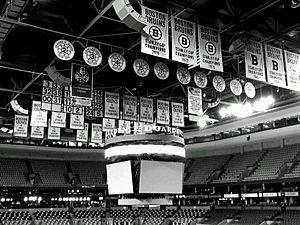
| No. | Player | Position | Career | No. Retirement |
|---|---|---|---|---|
| 2 | Eddie Shore | D | 1926–1940 | January 1, 1947 |
| 3 | Lionel Hitchman 1 | D | 1925–1934 | February 22, 1934 |
| 4 | Bobby Orr | D | 1966–1976 | January 9, 1979 |
| 5 | Aubrey "Dit" Clapper | RW, D | 1927–1947 | February 12, 1947 |
| 7 | Phil Esposito | C | 1967–1975 | December 3, 1987 |
| 8 | Cam Neely | RW | 1986–1996 | January 12, 2004 |
| 9 | Johnny Bucyk | LW | 1957–1978 | March 13, 1980 |
| 15 | Milt Schmidt | C | 1936–1955 | March 13, 1980 |
| 16 | Rick Middleton | RW | 1976–1988 | November 29, 2018 |
| 22 | Willie O'Ree | LW | 1957–1958, 1960–1961 | January 18, 2022 |
| 24 | Terry O'Reilly | RW | 1972–1985 | October 24, 2002 |
| 77 | Ray Bourque | D | 1979–2000 | October 4, 2001 |
Notes:
- 1 Hitchman was the first player to have his number retired by the Bruins. He was also the second in the NHL and in all of North American professional sports.
- The NHL retired Wayne Gretzky's number 99 for all teams in 2000.
- The Bruins are the only Original Six team that has not retired uniform number 1.
Hall of Famers
The Boston Bruins have 58 people in the Hockey Hall of Fame. This includes 52 former players and six people who helped build the sport. The builders include former Bruins executives, general managers, coaches, and owners. Two Bruins broadcasters also won the Foster Hewitt Memorial Award.
Players
- Dave Andreychuk
- Marty Barry
- Bobby Bauer
- Leo Boivin
- Ray Bourque
- Frank Brimsek
- Johnny Bucyk
- Billy Burch
- Zdeno Chara
- Gerry Cheevers
- Dit Clapper
- Sprague Cleghorn
- Paul Coffey
- Roy Conacher
- Bun Cook
- Bill Cowley
- Cy Denneny
- Woody Dumart
- Phil Esposito
- Fernie Flaman
- Frank Frederickson
- Jarome Iginla
- Busher Jackson
- Tom Johnson
- Duke Keats
- Guy Lapointe
- Brian Leetch
- Harry Lumley
- Mickey MacKay
- Sylvio Mantha
- Joe Mullen
- Cam Neely
- Adam Oates
- Harry Oliver
- Bobby Orr
- Brad Park
- Bernie Parent
- Jacques Plante
- Babe Pratt
- Bill Quackenbush
- Jean Ratelle
- Mark Recchi
- Art Ross
- Terry Sawchuk
- Milt Schmidt
- Eddie Shore
- Babe Siebert
- Hooley Smith
- Allan Stanley
- Nels Stewart
- Tiny Thompson
- Joe Thornton
- Rogie Vachon
- Cooney Weiland
Builders
- Charles Adams
- Weston Adams
- Walter A. Brown
- Pat Burns
- Willie O'Ree
- Harry Sinden
Franchise Leaders
All-Time Regular Season Scoring Leaders
These are the top ten players with the most points in Bruins history during the regular season.
- * – current Bruins player
Note: Pos = Position; GP = Games played; G = Goals; A = Assists; Pts = Points; P/G = Points per game
|
|
|
All-Time Playoff Scoring Leaders
These are the top ten players with the most points in Bruins history during the playoffs.
- * – current Bruins player
Note: Pos = Position; GP = Games played; G = Goals; A = Assists; Pts = Points; P/G = Points per game
|
|
|
All-Time Leading Goaltenders
These goalies are in the top ten for wins in Bruins history.
- * – current Bruins player
Note: GP = Games played; W = Wins; L = Losses; T = Ties; OT = Overtime losses; SO = Shutouts; GAA = Goals against average
|
|
NHL Awards and Trophies
- 1927–28, 1928–29, 1929–30, 1930–31, 1932–33, 1934–35, 1937–38, 1938–39, 1939–40, 1940–41, 1970–71, 1971–72, 1973–74, 1987–88, 1989–90, 2010–11, 2012–13, 2018–19
Art Ross Trophy (Most Points)
- Phil Esposito: 1968–69, 1970–71, 1971–72, 1972–73, 1973–74
- Bobby Orr: 1969–70, 1974–75
- Joe Thornton: 2005–06
Bill Masterton Memorial Trophy (Perseverance, Sportsmanship, Dedication)
- Charlie Simmer: 1985–86
- Gord Kluzak: 1989–90
- Cam Neely: 1993–94
- Phil Kessel: 2006–07
Calder Memorial Trophy (Rookie of the Year)
- Frank Brimsek: 1938–39
- Jack Gelineau: 1949–50
- Larry Regan: 1956–57
- Bobby Orr: 1966–67
- Derek Sanderson: 1967–68
- Ray Bourque: 1979–80
- Sergei Samsonov: 1997–98
- Andrew Raycroft: 2003–04
Conn Smythe Trophy (Playoff MVP)
- Bobby Orr: 1969–70, 1971–72
- Tim Thomas: 2010–11
Frank J. Selke Trophy (Best Defensive Forward)
- Steve Kasper: 1981–82
- Patrice Bergeron: 2011–12, 2013–14, 2014–15, 2016–17, 2021–22, 2022–23
Hart Memorial Trophy (League MVP)
- Eddie Shore: 1932–33, 1934–35, 1935–36, 1937–38
- Bill Cowley: 1940–41, 1942–43
- Milt Schmidt: 1950–51
- Phil Esposito: 1968–69, 1973–74
- Bobby Orr: 1969–70, 1970–71, 1971–72
- Joe Thornton: 2005–06
Jack Adams Award (Coach of the Year)
- Don Cherry: 1975–76
- Pat Burns: 1997–98
- Claude Julien: 2008–09
- Bruce Cassidy: 2019–20
- Jim Montgomery: 2022–23
James Norris Memorial Trophy (Best Defenseman)
- Bobby Orr: 1967–68, 1968–69, 1969–70, 1970–71, 1971–72, 1972–73, 1973–74, 1974–75
- Ray Bourque: 1986–87, 1987–88, 1989–90, 1990–91, 1993–94
- Zdeno Chara: 2008–09
King Clancy Memorial Trophy (Leadership and Community Service)
- Ray Bourque: 1991–92
- Dave Poulin: 1992–93
- Patrice Bergeron: 2012–13
Lady Byng Memorial Trophy (Sportsmanship and Skill)
- Bobby Bauer: 1939–40, 1940–41, 1946–47
- Don McKenny: 1959–60
- John Bucyk: 1970–71, 1973–74
- Jean Ratelle: 1975–76
- Rick Middleton: 1981–82
Lester B. Pearson Award (MVP as voted by players)
- Phil Esposito: 1970–71, 1972–73
- Bobby Orr: 1974–75
Lester Patrick Trophy (Contributions to Hockey in the U.S.)
- Charles F. Adams: 1966–67
- Walter A. Brown: 1967–68
- Eddie Shore: 1969–70
- Cooney Weiland: 1971–72
- John Bucyk: 1976–77
- Phil Esposito: 1977–78
- Bobby Orr: 1978–79
- Milt Schmidt: 1995–96
- Harry Sinden: 1998–99
- Willie O'Ree: 2002–03
- Ray Bourque: 2002–03
- Cam Neely: 2009–10
Mark Messier Leadership Award (Great Leadership)
- Zdeno Chara: 2010–11
- Patrice Bergeron: 2020–21
Maurice "Rocket" Richard Trophy (Most Goals)
- David Pastrnak: 2019–20
NHL Foundation Player Award (Community Service)
- Patrice Bergeron: 2013–14
NHL Leading Scorer (Before Art Ross Trophy)
- Herb Cain: 1943–44
- Bill Cowley: 1940–41
- Milt Schmidt: 1939–40
- Cooney Weiland: 1929–30
Vezina Trophy (Best Goalie)
- Tiny Thompson: 1929–30, 1932–33, 1935–36, 1937–38
- Frank Brimsek: 1938–39, 1941–42
- Pete Peeters: 1982–83
- Tim Thomas: 2008–09, 2010–11
- Tuukka Rask: 2013–14
- Linus Ullmark: 2022–23
William M. Jennings Trophy (Goalies with Fewest Goals Allowed)
- Andy Moog and Rejean Lemelin: 1989–90
- Tim Thomas and Manny Fernandez: 2008–09
- Tuukka Rask and Jaroslav Halak: 2019–20
- Linus Ullmark and Jeremy Swayman: 2022–23
Team Awards
The Bruins give out several team awards at their last home game of the regular season:
- Elizabeth C. Dufresne Trophy - For the best player in home games.
- Seventh Player Award - For the player who performed much better than expected.
- Eddie Shore Award - For the player with the most hustle and determination.
- John P. Bucyk Award - For community service.
- Bruins Radio Network Three-Star Awards - For the most times chosen as one of the top three players in a game.
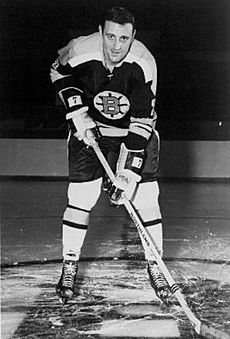
Franchise Individual Records
- Most goals in a season: Phil Esposito, 76 (1970–71)
- Most assists in a season: Bobby Orr, 102 (1970–71)
- Most points in a season: Phil Esposito, 152 (1970–71)
- Most penalty minutes in a season: Jay Miller, 304 (1987–88)
- Lowest goals against average in a season: Frank Brimsek, 1.56 (1938–39)
- Most points per game in a season: Bill Cowley, 1.97 (1943–44)
- Most points in a season, defenseman: Bobby Orr, 139 (1970–71)
- Most points in a season, rookie: Joe Juneau, 102 (1992–93)
- Most wins in a season (goalie): Pete Peeters, 40 (1982–83); Linus Ullmark, 40 (2022–23)
- Most shutouts in a season (goalie): Hal Winkler, 15 (1927–28)
- Consecutive games played streak: John Bucyk, 418 (January 23, 1969 – March 2, 1975)
- Longest point scoring streak: Bronco Horvath, 22 games (1959–60)
- Highest save percentage in a season (goalie): Tim Thomas, .938 (2010–11)
- Longest winning streak by a goaltender, one season: Gilles Gilbert, 17 (1975–76)
Media and Broadcasters
- NESN (New England Sports Network)
- Judd Sirott: TV play-by-play
- Andy Brickley: TV color analyst
- Andrew Raycroft: Rinkside reporter
- Adam Pellerin: Rinkside reporter
- 98.5 The Sports Hub
- Ryan Johnston: Radio play-by-play
- Bob Beers: Radio color analyst
See also
 In Spanish: Boston Bruins para niños
In Spanish: Boston Bruins para niños
- Bruins–Canadiens rivalry
- List of Boston Bruins award winners
- List of Boston Bruins records
- Sports in Massachusetts
- Sports in Boston
- The Sports Museum (at TD Garden)


